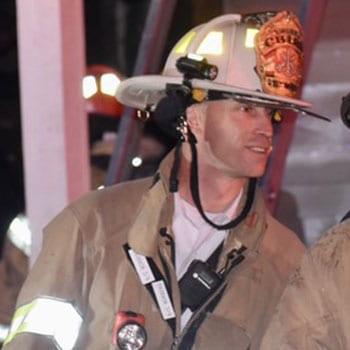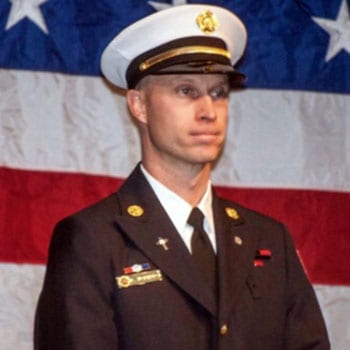How Employer Support Helped Eric Norberg Earn a Degree at 49
Eric Norberg never considered himself to be a great student. Yet last May, at 49 years old, he graduated from Providence College with a bachelor’s degree. It’s an accomplishment he says likely wouldn’t have been possible if it weren’t for his employer’s willingness to invest in him and the strong support he found as an adult student at PC’s School of Continuing Education (PCSCE).
Norberg, who has worked for the West Warwick, Rhode Island fire department since 1995, had already received two promotions in his career before enrolling at PCSCE. He was promoted from firefighter to lieutenant in 2005, then to Captain in 2011.
But as he watched the firefighting profession evolve to become more technically advanced, Norberg says he knew he needed to evolve as well if he wanted to further his career. So, he decided to pursue a bachelor’s degree in Fire Administration at PCSCE.

“I’ve been working for the West Warwick, Rhode Island fire department since 1995. Over the years, fire service has really evolved in terms of both the technology and the profession,” he says.
“I think people would be surprised if they knew all that the fire department actually does besides what they see with the lights and sirens. We’re an educated workforce. We’re still a blue-collar workforce, and hard workers, but now we’re a much more educated force as well.”
Norberg says the idea of going back to school as an adult with a full time job and a family was a bit daunting at the time. But the fact that his employer supported his efforts by providing tuition assistance as well as encouragement made all the difference.
“If I hadn’t had that tuition reimbursement I probably wouldn’t have gone back to school, and I don’t take that for granted for one second,” he says.
“Having my employer support my education is a recognition that we’re valued and our education is valued, which in turn only contributes to our service and the work we perform. The return on their investment is personnel that are educated and can perform even better.”
“It comes down to recognizing that it’s not just about, ‘What does it cost?,’ but really ‘What is the value?’ The dividends that get paid back far outweigh the financial cost.”
That was certainly the case for Norberg. He was able to immediately apply the knowledge and skills he was learning in the classroom to his job and that led to advancement in his career even before he earned his bachelor’s degree. In 2018 he was promoted to Battalion Chief.

“As I progressed through the ranks, I utilized a lot of the skills I learned at PCSCE, and not just the knowledge and skills I learned in the fire administration classes.”
“The fire science classes of course were all extremely valuable and they all tied in directly with my career,” Norberg says. “I learned about everything from fire investigation tactics and strategy, to hydraulics, to collective bargaining issues.”
“But the general education and core curriculum classes were also really helpful in making me a more well-rounded person and professional. The English and writing classes helped with my technical report writing and fire incident reporting, for example.”
“I even got to take a really interesting theology course with a professor who’s a retired firefighter, Professor Richard Kless. And the study skills I learned have also helped me with taking tests and writing papers for other fire certifications as well.”
Now that he’s got his bachelor’s degree, Norberg has the ability to advance even further in his career – an invaluable opportunity that he likely would not have had before.
Norberg says his success is also thanks to the strong support he received as an adult student at PCSCE.
That success included his induction into Eta Lambda, PC’s chapter of the Alpha Sigma Lambda national honor society for adult college students – quite an accomplishment for someone who once considered himself to be “not much of a student” at all.
“Jennifer Andrews, my academic adviser at PCSCE, was with me every step of the way, making sure I had no problems, issues, or concerns. She really worked to connect the dots for me and made my whole experience there seamless,” he says.
“The professors there are all great, too. They recognize that adult students are there because they’re working hard toward a goal but that they’re also working full time jobs, have families and are juggling multiple things.”
“I can’t recommend enough to the new firefighters coming on in my fire department, or anyone else whose employer offers tuition reimbursement, to take advantage of that opportunity to receive an education. It’s invaluable monetarily and what you get from it in terms of your knowledge and skills is something no one can take away from you.”





